Processing: The Sensory Channels
Words to know for chapter 4:
Process - how your brain uses information
Compensate - using a strength to make up for a weakness
Storage - putting something away for safe keeping
Retrieval - getting something out of storage
Sensory - using your senses (sight, hearing, touch, smell, taste)
Cognitive - using your brain
Channel - a path used for information to travel
Modality - a method used for processing information
Visual - information that you see
Auditory - information that you hear
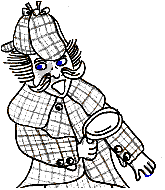
'For the next step in this mystery, we will need to explore the dark and dangerous caverns of your brain. We will follow the same pathways that information travels to find out how your brain operates. You might want to wear gloves....this could get messy.'
'Follow me.........'
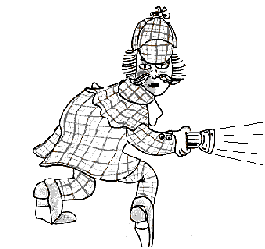
As we have learned, having a learning disability means that information gets 'stuck' or confused while going through, or being 'processed' by your brain.
But what is 'processing'???
There are many, maybe hundreds of ways in which your brain processes different kinds of information. But we will just focus on two main types of processing that are believed to be most responsible for learning:
•Sensory processing - how your brain uses information from your senses (vision, hearing, touch, smell, taste)
•Cognitive processing - what your brain does after the information comes in through the senses
Entering the brain - The sensory channels:
Information is provided in many different ways but first enters the brain through the 5 sensory processing channels or 'modalities' which include:
Hearing
Touch
Taste
Smell
These channels are the first areas where information processing difficulty can occur.
But, how often do you really taste or smell things in school? And, even though you sometimes touch or feel things in school, you aren't going to have trouble learning just because things don't 'feel' right. So really, the main sensory processing areas that can cause you trouble in school are:
•visual: does your brain understand what you see?
•auditory: does your brain understand what you hear?
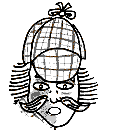 Important
clue!!!!! Sensory processing is different from how well you see or
hear. A person with a visual processing disability is actually able
to see as well as anyone else, but his or her brain has difficulty
making sense of visual information. For such a student, auditory
information is usually processed much faster and better.
Important
clue!!!!! Sensory processing is different from how well you see or
hear. A person with a visual processing disability is actually able
to see as well as anyone else, but his or her brain has difficulty
making sense of visual information. For such a student, auditory
information is usually processed much faster and better.
Other sensory processing channels including smell, taste, and touch can be important alternative processing channels but are seldom, if ever found to be primary areas of information processing disability. The sense of touch can be especially important and will be discussed further when we investigate 'Haptic' processing.
Right now. let's look closely at visual and auditory processing.
Visual Processing involves how well your brain can use visual information. When you see something, especially something complex, do you understand it quickly and easily. Can you 'visualize' things (like pictures, shapes, words, etc.) in your head? Can you remember information that you see?
Visual Processing includes:
- seeing differences between things
- remembering visual details
- filling in missing parts in pictures
- remembering general characteristics
- visual-motor coordination
- visualization and imagination
- organization of your room, desk, etc.
- art
People with a general visual processing disability often experience most learning difficulty in the areas of math and spelling because they have trouble 'visualizing' words, letters, symbols, etc.
Specific difficulties may include:
- writingDo you think Visual Processing is a strength or a weakness for you?poor handwriting
poor spelling (cannot visualize the words)- math
difficulty visualizing problems
difficulty with cluttered worksheets- reading
slow speed- general
poor comprehensionpoor organization/planning/neatness
difficulty rechecking work for accuracy
difficulty learning by demonstration
difficulty learning by video
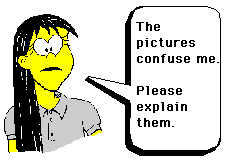
Auditory processing involves how well you can understand auditory information. Can you 'keep up' when people talk very fast? Can you tell voices apart easily (even on the phone)? Can you imagine the voices of familiar people in your head? Can you remember information that your hear?
Auditory Processing includes:
- hearing differences between sounds/voices
- remembering specific words or numbers
- remembering general sound patterns
- Understanding even when you miss some sounds
- blending parts of words together
- music
People with a general auditory processing disability usually have most difficulty with general reading, general writing, and language (understanding and expressing). Specific difficulties may include:
- readingpoor decoding of new words- writing
poor comprehensionpoor spelling/mechanics- communication
poor sentence structuredifficulty with expression- general
poor receptive languagedifficulty following oral directions
difficulty learning in lectures
Do you think Auditory Processing is a strength or weakness for you?
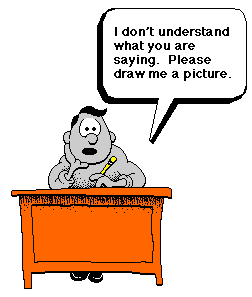
Don't forget!!! Auditory and visual processing involves much more than whether you can see and hear.
What is important is how well your brain is able to understand and use the information after you see and hear it.
Next chapter we go deeper into the brain.
Review Questions:
1. What are the five areas of 'sensory' processing discussed in this chapter?
2. Which two sensory processing areas are most important for learning?
3. How is 'visual processing' different from how well you can 'see'?
4. How is 'auditory processing' different from how well you can 'hear'?
5. Give an example of how your other senses (touch, smell, taste) could be used for learning?
Uncovering the Mysteries of your Learning Disability
Order printed copies of this manual
- Chapter 1 - What is a Learning Disability?
- Chapter 2 - What Causes Learning Disabilities?
- Chapter 3 - Discrepancy = Underachievement
- Chapter 4 - Processing: The Sensory Channels
- Chapter 5 - Processing: The Cognitive Channels
- Chapter 6 - Processing: Sensory + Cognitive
- Chapter 7 - LD Jargon
- Chapter 8 - Using Accommodations
- Chapter 9 - Other Issues Related to LD
- Chapter 10 - Intelligence vs IQ
- Chapter 11 - Exercizing Your Weakness
- Chapter 12 - LD and the Law
- Chapter 13 - Becomming an Effective Self-Advocate
- Chapter 14 - Planning for Your Future
- Chapter 15 - The Summary
Copyright © 2006-2017 LDinfo Publishing
All rights reserved. Any reuse or republishing of the text
or images on this web site without prior written consent of
the copyright holder is prohibited.